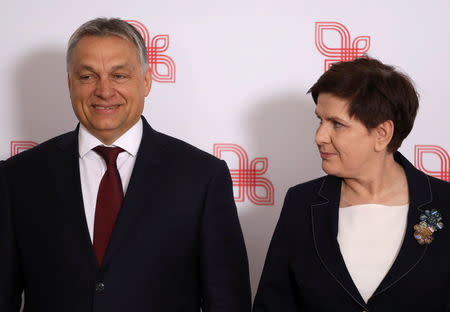Central European leaders vow not to be blackmailed by EU on migration
By Pawel Sobczak WARSAW (Reuters) - The leaders of four Central European countries vowed on Tuesday not to be blackmailed by threats of financial punishment from Brussels if they don't join in the relocation of thousands of Middle Eastern and African refugees. Austria also said it will seek an exemption from having to accept more asylum-seekers, arguing that it has already taken in its fair share during Europe's migration crisis. The prime ministers of the Visegrad Group (V4) -- Poland, Slovakia, Hungary and the Czech Republic -- said they have a sovereign right to decide how to deal with the migrants who have flooded into the continent mainly from the war in Syria. The EU's top migration official warned member states last week against failing to host refugees to help alleviate the pressure on countries like Greece and Italy, which have borne the brunt of arrivals across the Mediterranean. A number of politicians in the western EU have also spoken in favor of the bloc's plans to take actions against countries that do not want to accept refugees, including having their EU funding cut. "Poland and the Visegrad Group will never agree to this blackmail or to such conditions to be dictated," Polish Prime Minister Beata Szydlo told reporters journalists after the V4 meeting. Slovak Prime Minister Robert Fico also said it was "blackmail" to tie the issue of EU funding to migration policy. Hungarian Prime Minister Viktor Orban, who has called mass migration a "Trojan horse for terrorism" also defended his new policy to detain migrants at the border. Fewer than 14,500 asylum-seekers have been relocated from Greece and Italy under the two-year EU plan that was supposed to cover 160,000 people and which expires in September. Some 1.6 million refugees and migrants reached the European Union between 2014 and 2016 and how to handle them has been a major point of contention between member states. "The current migration policy has failed the exam," Szydlo said. (Additional reporting by Lidia Kelly, Anna Wlodarczak-Semczuk, Angieszka Barteczko, Pawel Florkiewicz in Warsaw and Krisztina Than in Budapest; Writing by Lidia Kelly Editing by Jeremy Gaunt)


